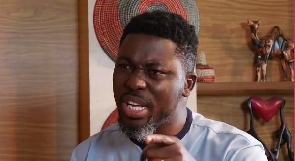Opinions of Wednesday, 23 October 2013
Columnist: Cleland, Esi
5 things new Ghanaian parents must know
by Esi Cleland
Are you a new parent? Finding teaching your kids stuff a chore? Being a new one has turned out to be a fascinating experience for the author of this piece, and she shares her tips with Citifmonline.com
The Best Thing The best thing parents can do for their kids is teach them life lessons. It turns out the important lessons are not many. So you have plenty of time to teach them all, and thoroughly. Assume you're a really slow teacher and it takes you an entire year to completely teach one lesson. Also assume that the age at which kids begin to understand concepts is 5 years. You could still be done teaching your kids the most important life lessons by age 15. That’s a whole three years before they’re legally adults! Africa thanks you very much!
Face It Face it. Taking care of a child is not an easy responsibility to bear. Because of the burden of that responsibility, there is the risk of leaving their training to chance unless you are deliberate about it. The reason teaching children lessons ends up being a messy process is not the kids’ capacity or willingness to learn as often cited by parents. In fact, the key limiting factors all appear to be parent-related. First, most of parents don't decide what we want to teach. Secondly we’re are not effective at teaching the principles because we don’t know when to teach them.
But there is hope; both problems have solutions.
Deciding What to Teach The first problem. Parents don't decide what they want to teach.
The world changes. What you learn today is obsolete tomorrow. For this reason, we must agree to teach unchanging truths about the way life works, also known as life principles. These are the truths to hold on to, whilst adapting to the changing world. If any of these truths stop being true, we have bigger problems to deal with like the end of the world as we know it. Principles are quite separate from values which differ from person to person. I will leave you to transmit whatever values you like.
But principles are facts like “Eggs spoil.” Whilst values are more like the way you like to eat your egg. Even though I prefer my eggs overcooked, if my child wants to eat raw eggs, I will let her. But I want her to her raw eggs whilst bearing in mind that eggs spoil.
Deciding When to Teach The second problem. It looks like a lot of parents don't actually decide when to teach these lessons. They just make it up as they go.
The better way to go about teaching life principles is to first decide what you want to teach your kids, and then learn proven methods of teaching these principles at the right time.
Now let’s delve into the life lessons.
Life Lesson 1 - Actions Have Consequences. Be Deliberate (Age 0-5). Every parent who has ever bought a cane, even if they only meant to use it as a threat but never actually used it on their kid was trying to teach this lesson. So in that sense, parents who are against the use of the cane are right. It's not about the cane. The worst thing you can do is to, without meaning to, teach your kids that bad actions lead to caning. Unfortunately, most of the parents against the use of cane also miss the lesson. They allow kids to do whatever they want. They also end up teaching their kids that bad actions have no consequences. But it looks like what we actually want to teach is that actions have consequences. The Christians will say, you reap what you sow. The physicists will say, to every action there is an equal and opposite reaction. But that has to be supported with principles of cause and effect in non-physical worlds where, for example, a small lie can lead to big consequences.
Because humans are self-interested, it is probably more effective to use consequences that affect the person doing the action, and the more immediate the consequence, the better. Here are some other examples of this principle that offer teachable moments: Touching fire will get you burnt; eating hot food will scald your mouth; sleeping too little or too much will leave you tired; knowing less will get you cheated; working at something leads to its improvement; ignoring a thing leads to its decay; thinking good thoughts leads to optimism; what you say affects people. In other words, there is no such thing as an action without consequence. And if the consequence isn’t observed, it does not mean there was none.
Esi Cleland is the CEO of Ghanaian fashion house AfroChic and a member of the World Economic Forum's Global Shapers. But more importantly, she's a mother.












